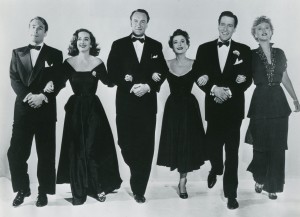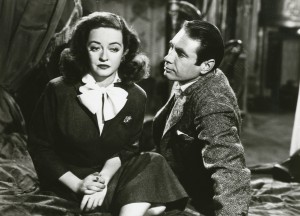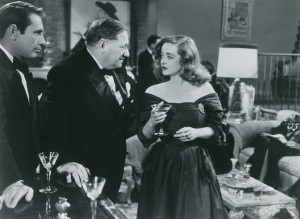by Barb Lentz
The five movies Bob provided for me from which to choose were these:
All About Eve (1950)
David Copperfield (1935)
Ikiru (1952)
The Sea Hawk (1940)
Sleeper (1973)
I chose All About Eve from this list. It features Bette Davis, Celeste Holm, Anne Baxter and Marilyn Monroe in a small part. I have heard of this title so many times, so it seemed so familiar, but I’d never seen it.

All About Eve is about people in the world of theatre –- actresses and actors, playwrights, and critics. It opens with young actress Eve Harrington (Anne Baxter) receiving a most distinguished award. The story is told in flashback fashion. It is to the fim’s credit that you cannot guess the background story from the shots of the audience, just that they are involved in it.
Margo Channing (Bette Davis), is the star of many plays. She has a life that many would envy, and one in particular does. Karen (Celeste Holm) is Margo’s best friend, as well as the wife of the playwright in whose play Margo stars. Karen visits Margo every night after the performance, and has noticed a fan hanging around the theater. One night she invites her to meet Margo. It is Karen who is continually asked for favors from the fan. The fan is Eve Harrington, who has a touching story of tragedy and is quickly befriended by Margo.
Margo has an assistant, Birdie (Thelma Ritter), who is suspicious of Eve. Birdie voices her skepticism to Margo. It takes awhile, but Margo begins to see through Eve. Everyone else continues to take Eve at face value, including Karen, her playwright husband, Lloyd (Hugh Marlowe), and even Bill (Gary Merrill), Margo’s love interest. Eve is able to manipulate those around her to get her biggest wish, to not only become Margo’s understudy, but also to star in Lloyd’s next play.

Another key character is the play critic Addison DeWitt (George Sanders). He is very wry and observant. He also sees through Eve, and it is in a late scene where Eve is bursting with news of her latest supposed triumph that Addison lets Eve know that he knows who and what she really is. But my favorite character was Birdie, who was just as observant and yet said whatever was on her mind without making a big deal about it (unlike Addison, who always made a big deal about his opinions).
I have to say that I was also skeptical of Eve from the beginning of the movie. Part of it might have been because I read the description of the movie on the Laser Disc, or maybe because it is a film, and she was simply too good to be true. Even though he was mean, I liked Addison, and especially the way he handles Eve in the scene I described in the previous paragraph. I really enjoyed the fashions created by Edith Head; people don’t dress like that anymore. My favorite aspect is how the characters were able to banter back and forth without taking any of the insults personally — at least for the most part. For instance, the banter between Margo and Birdie sounded contentious, but really wasn’t. I also liked that people valued friendship as much as they did, especially Bill after Addison publishes a nasty column about actresses “of a certain age.” Finally, I liked how the movie acts as a circle, with Phoebe (Barbara Bates) arriving at the end just like Eve did at the beginning.
My top five moments of the movie are:
1. When Bill and Margo reconcile after Addison’s mean-spirited column. I didn’t expect him to return, so it was not only a genuine surprise but a welcome one.
2. When Eve is rebuffed, first by Bill (overheard by Addison) and then by Addison after she tells him about her plans. The best scene in the movie has Addison taking control, telling Eve that he knows all about her (just like the title) and turning her plans completely upside down for his own benefit.

3. When Miss Casswell (Marilyn Monroe) doesn’t take any guff from Addison. He insults her but she refuses to let it bother her. When Eve suggests that Addison would find her boring, Miss Casswell says “You won’t bore him long; you won’t get a chance to talk!”
4. When both Margo and Karen are betrayed by Eve, and yet both are still willing to help her. Margo tries to get Max Fabian (Gregory Ratoff) to take her on, and Karen allows herself to be blackmailed in order for Eve to nab a plum part. In the end, they simply accept Eve for who she is, or rather, who she has turned out to be.
5. When Margo hands Eve the Sarah Siddons award and tells her, “Nice speech, Eve. But I wouldn’t worry too much about your heart. You can always put that award where your heart ought to be.” Nice comeuppance.
Is All About Eve a classic? Yes, I would say so. It has a lot to say about the world of the theater, about how people are different there and yet still share all the universal traits we all do. It’s dramatic, and funny, and surprising. I like the way it circles back on itself to start the cycle all over again. It kind of parallels the world of business in that people will do anything to get ahead, no matter the cost to others, or themselves. In that way it is as contemporary now as it was then.
BRL 23 February 2014.
All About Eve (October 13, 1950) 20th Century-Fox.
Directed by Joseph L. Mankiewicz. Produced by Darryl F. Zanuck.
Written by Joseph L. Mankiewicz.
Principal Cast (character, performer):
Margo Channing Bette Davis
Eve Harrington Anne Baxter
Addison DeWitt George Sanders
Karen Richards Celeste Holm
Bill Sampson Gary Merrill
Lloyd Richards Hugh Marlowe
Max Fabian Gregory Ratoff
Phoebe Barbara Bates
Miss Casswell Marilyn Monroe
Birdie Coogan Thelma Ritter
Aged Actor (at awards) Walter Hampden
Girl (Eve’s roommate) Randy Stuart
138 minutes. B&W. Not Rated.
